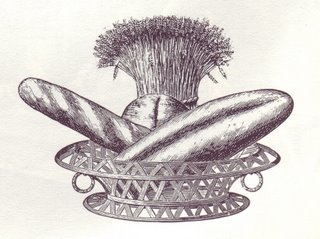 Today, September 8th …
Today, September 8th …The fondness of the English for their pooches and ponies is usually seen as an endearing national eccentricity, but even for their pets, the English will only go so far when the call to patriotism is heard. For the few who put their pets before their people in 1917, the law came down hard. On this day in 1917, The Times carried the following article:
“For using bread as otherwise than for human food, Miss Caroline Stiff was fined £5 at Dover yesterday. She had 14 dogs, and admitted to the food inspector that she gave them bread and milk for breakfast, oddments of bread and biscuits soaked in gravy for dinner, bread and biscuits for tea, and bread and milk for supper. She lived alone and had taken 20lb. of bread weekly.”
Miss Stiff got off fairly lightly. In May, a Miss Fawkes had been fined £9 for obtaining 16 loaves to feed a pet pony. Clearly a couple of very unpatriotic ladies got their comeuppance.
Wheat, and hence bread, was in very short supply at this point in World War I, and although it was not rationed as such, there were strict regulations as to its manufacture, and a strong expectation that everyone would do their bit and not waste a single crumb. One tenet accepted very early in the debate was that “too much human food could not be sacrificed to animals”. The public were assured by the London Zoo in May 1917 that:
“Bread formerly used for the apes and monkeys and some small mammals has been replaced by flour not up to the Board of Trade standard for human consumption, and by ship’s biscuits which have made one or two voyages unused and are then rejected as no longer fit for issue.”
What is even more astonishing, given the English love of horse-racing and blood sports is that there was support for reducing horse-racing and fox-hunting “to reduce the diversion of food to animals”. To that end, some Hunt Masters voluntarily slaughtered their fox-hounds! Now that is (was) English patriotism at its most extreme!
Naturally there was plenty of advice in the newspapers as to how to use every stale scrap of bread, and even better – to substitute for it as much as possible.
Recipes for the Day …
Patriotic citizens with culinary skills contributed their food-saving ideas to the newspapers during the war: here are a couple of recipes from this week in 1917.
Potato Cakes.
To the Editor of The Times.
Sir. – Owing to flour’s being dearer than potatoes, potato cakes would bevery appetising at breakfast or tea. To make them take 1lb. of well-mashed potatoes, add pepper and salt according to taste, also some butter (about the size of a walnut); then add an egg, but milk is used for economical purposes. Form them into small rounds and bake to a golden brown, and then they will be found to be excellent.
Yours faithfully, S. Lisle-Simpson, Compton, Milford-on-Sea, Hants. [The Times, Sept 6th 1917]
Economy Pudding.
A “Mother” writes that her children like best for their luncheon at school a slice of what she calls “economy pudding”. “To make it I soak scraps of stale bread and cake overnight,” she says. “Then, after straining it till dry I beat them with a fork, till fine, and add a little orange peel if I can get it, or lemon peel, with dripping, sugar, and spice, a pinch of baking powder, and a little milk. This I place in a basin and steam or bake in the oven. It is very good when sliced cold, or for dinner the slices can be fried and spread with syrup or jam.” [The Weekly Dispatch, September 9th 1917]
Monday’s Story …
Fried ink-pots.
Quotation for the Day …
Bread that must be sliced with an axe is bread that is too nourishing. Fran Lebowitz
1 comment:
Hello Joe! I've noticed that you and I have an uncanny way of picking similar topics sometimes. Great Minds Think Alike, Huh?
Post a Comment